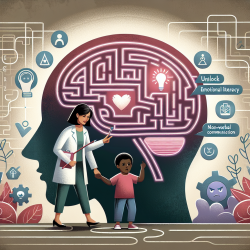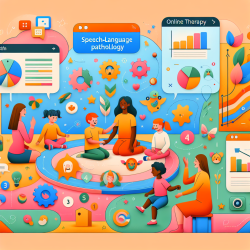As practitioners dedicated to enhancing the lives of children, speech-language pathologists (SLPs) must continually evolve their approaches to therapy. One critical area of focus is the development of emotional literacy, especially for children diagnosed with Autism Spectrum Disorder (ASD). The research article, "The Muscles of the Psyche: From Body Literacy to Emotional Literacy" by Maya Vulcan, offers valuable insights into this topic.
Vulcan's study emphasizes the significance of somatic and kinetic interventions in therapeutic settings. This approach is particularly effective for children with ASD, who often face challenges with traditional verbal communication methods. Here are some key takeaways from the research and practical applications for SLPs:
1. The Primacy of Bodily Experience
The study highlights the importance of bodily presence in therapy. Many therapists reported that physical closeness and touch are crucial in establishing a connection with their clients. This can be particularly relevant for SLPs working with children who have difficulty expressing themselves verbally.
2. Body-Oriented Interventions
SLPs can integrate body-oriented interventions into their practice. Techniques such as mirroring the child's movements, using touch to communicate, and positioning oneself in space to facilitate interaction can enhance the therapeutic process. These methods help bypass verbal communication barriers and foster a sense of connection.
3. Addressing Lower Bodily Functions
Therapists in the study expressed the importance of accepting and addressing lower bodily functions like saliva, phlegm, and excrement. This acceptance helps create a non-judgmental space where children feel safe to express themselves. SLPs can adopt a similar approach to help children feel more comfortable and open during therapy sessions.
4. Non-Verbal Communication
Non-verbal communication plays a significant role in therapy. SLPs can use sensory aspects like voice, smell, and movement to connect with children. Understanding and responding to these non-verbal cues can lead to more effective therapy outcomes.
5. Moments of Connection
Therapists often experience "WOW" moments—brief instances of connection that make a significant impact. These moments are usually triggered by non-verbal, somatic interactions. SLPs should remain attentive to these subtle cues and celebrate these small victories, as they are crucial in building a therapeutic relationship.
6. Training and Support
SLPs should seek training that includes a focus on somatic awareness and body literacy. This training can enhance their ability to use body-oriented interventions effectively. Incorporating practices from dance, movement therapy, and other embodied approaches can enrich the therapist's toolkit.
In conclusion, the research by Maya Vulcan underscores the importance of integrating somatic and kinetic interventions into therapy for children with ASD. By focusing on the body's role in emotional literacy, SLPs can develop more effective strategies for fostering communication and emotional growth in their young clients.
To read the original research paper, please follow this link: The “Muscles of the Psyche”: From Body Literacy to Emotional Literacy.










